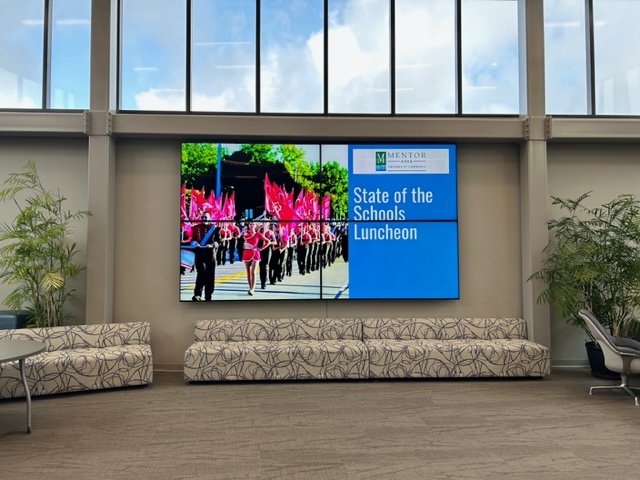Cardinal Nation Exclusive: State of the Schools Address
Superintendent Craig Heath reports the school's progress in the past year to the community
January 25, 2023
On Tuesday, at 11:30 a.m. in Mentor Schools’ Paradigm building, the Mentor Chamber of Commerce hosted
city government officials, parents, board members, and more to hear Superintendent Craig Heath’s state of the schools address. Everyone who was there enjoyed a delicious catered lunch from Manhattan Deli upon entrance and had the chance to speak with other leaders in the business world. Before long the audience was met with impressive visuals displayed on Apple TVs as Mr. Heath gave his address in the foreground.
What is the State of the Schools Address?
Each year, Mentor’s superintendent gives an address updating local business representatives, government officials, and the overarching community on the progress of the schools in the past year. This year was particularly notable as it was Mr. Heath’s first time addressing the community in such a way since assuming the role of superintendent in August.
Throughout the roughly hour-long presentation, Mr. Heath highlighted four main pillars: safety, education, resources, and community. These pillars highlighted the work of many of the people in attendance, such as the work of the Mentor Police Department and Lakeland’s CCP program, among many others. Of course, the focus of the
presentation was overwhelmingly on the success that Mentor students see on a daily basis.
Safety
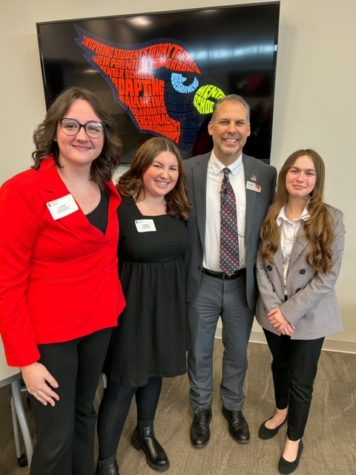
From the beginning of the morning, it was made clear that a priority of the school district is to maximize student safety. This aspect of the presentation involved understanding the multifaceted approach to safety used by the district.
The audience was also shown film from a recent lockdown drill at Mentor High School where police could be seen clearing the building and moving through the halls with heavy weapons. Mr. Heath also took the opportunity to acknowledge that the skills of Mentor’s Police and Fire Departments have been on display in schools recently following the lockdown at the high school shortly before winter break as well as the fire evacuation at Memorial Middle School a few weeks ago. The safety pillar also explained the partnership between the Mentor Schools and the city. Together, Mr. Heath reported that they would be completing a comprehensive safety drill in June of this year.
Moving towards personal safety, there was also an emphasis put on safety in terms of mental health and creating a safe learning environment for students amongst classmates. For one thing, the use of technology was used to monitor student’s search history to look for flagged words that may indicate an intention to cause harm to oneself or others, as well as potential mental health issues. The audience was also met with video from a Kindness Rally held at the high school that preached the importance of being kind, as well as ways in which to be kind.
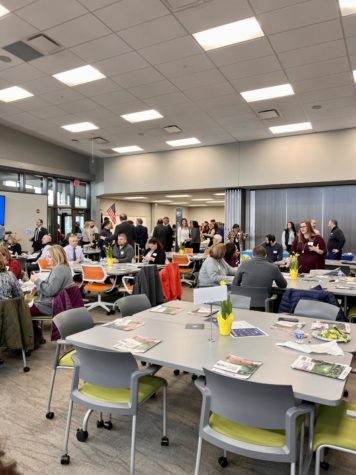
Education
In terms of education, this pillar started with a highlight of many successful programs currently taking place throughout the district. Mr. Heath discussed the role of the board liaison and the curriculum committee working to ensure that the curriculum being taught to students meets necessary standards as well as going above and beyond, such as elementary students taking a STEAM (science, technology, engineering, art, and math) class each week. As far as the curriculum committee goes, there was also information provided regarding revamping the math curriculum in elementary schools that is currently being tested by teachers in the district.
One of the biggest focuses of the day was the opportunities Mentor students, especially at the high school, possess. This involves higher level courses offered at the high school, such as honors and Advanced Placement courses. Furthermore, the College Credit Plus (CCP) program continues to allow students to earn both high school and college credits, with some even graduating with both a high school diploma and an associates degree simultaneously. Another aspect of this career readiness is the increasingly popular CTE (career technical education) program through Mentor, along with Euclid and Wickliffe. The differences in these programs was explored in more detail in an earlier Cardinal Nation article.
A highlight of the day for many came at this point, as the EMT program came to the front to demonstrate their knowledge.
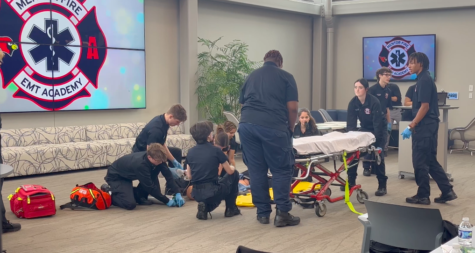
Resources
After the impressive demonstration by the CTE students, Mr. Heath began to explain his third talking point, resources. To begin, he introduced chief financial officer, Bill Wade. Mr. Wade explains where exactly our money is coming from; in the presentation it is concluded that 76.1% comes from local property taxes, 23.4% from governmental fundings, and the rest from outside resources. Following this, the budget is spent on various amenities needed by the school district. This includes 57% going to employee wages, 21.1% to benefits, 9% for services, 4.4% for materials, 6% to transfers and advances, and the rest to other necessary services. During the presentation, Mr. Heath revealed that earlier in the day Mentor Schools officially received a clean audit from the Auditor of the State of Ohio for the past year.
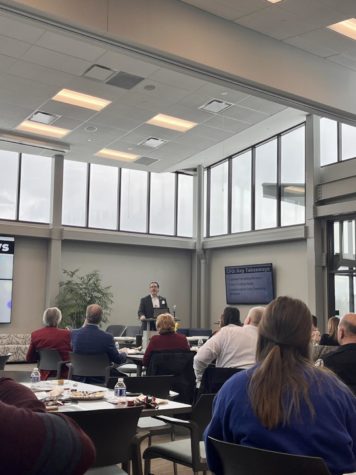
Furthermore, Mr. Heath explained the permanent improvements being made to Mentor Schools such as new roofings, pavements, and much more being added onto the district buildings. However, it has been found that this funding is not adequate for the needed supplies. Thus, future funding must be provided through a future permanent improvement levy in addition to the district being committed to cost-controlling measures.
One of the many solutions that Mr. Heath provided for these issues during this presentation was a retirement incentive. If taking this route, the district would allow long-term teachers to retire with an additional incentive. This, in return, will allow the district to hire younger teachers, lowering the cost of salaries as a result. The retirement incentive is one of the many presented solutions to lowering the impact of the district budget and Mr. Heath says the district has found success in it.
Along with this, Mr. Heath points out the amount of innovation in the district due to some of the resources present. He made his point about the high level that most students get the chance to work at through a display of the software technology the marching band uses to set up its’ performances.
Lastly, Mr. Heath explained that with saving money through incentives and other initiatives the district has resources to aid teachers through providing professional development so that they can also continue to better their classrooms and become better equipped to deal with the ever-changing school environment.
Community
Of course, the State of the Schools address could not take place if not for the community. The first aspect of this pillar involved Mr. Heath’s prestigious meeting with Governor DeWine at the governor’s mansion. This particular event involved meeting with a select number of superintendents from throughout the state to discuss school funding, safety, and the future of education.
He continued by explaining the business advisory council, furthering the spotlight on the connection between the school district and the local business community. Mr. Heath explains that he is hopeful that these connections will continue to allow students real-world opportunities while still in school.
The presentation could not have been concluded without identifying the importance of families throughout the school community. This was first acknowledged through the efforts of the PTA presidents through the district, parents and guardians who served throughout various levels of schooling to help provide for the children of that school. Mr. Heath also expressed appreciation towards volunteers who have helped bring back school spirit after the pandemic. These include events like field day in elementary schools. Not only are families giving back to the community, but so are students. Last year, middle school students took to the community in a day of service to help out residents in any way they could.
Community outreach also has proved to be incredibly valuable to Mentor students. For one thing, all students are eligible to receive a Mentor Public Library card to give them access to thousands of books- both physical copies and digital. Moreover, high school students are eligible to receive a bus pass from Laketran to utilize fro transportation as well as to Cardinal Credit Union, which currently has a location in the cafeteria in the high school.
Reactions – How did the address play?
Cardinal Nation was able to personally interview several key stakeholders in the audience to get their reaction to Superintendent Heath’s address and the issues he covered. Here is what several of them had to say:
Kevin Malecek, City Director of Economic Development
Cardinal Nation: How does the state of the schools affect the local economy?
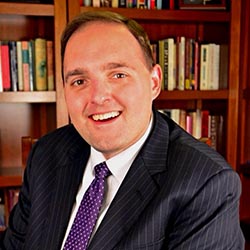
Kevin Malecek: I think in a variety of different ways. First, the future employees of companies in Mentor really rely on the strong state of Mentor Schools to ensure that they are going to have quality employees, skilled employees and employees that have the actual talents and skills that our employers in Mentor need to have. So making sure that there is a great relationship that exists between the business community and what’s going on in the schools is vitally important to make sure that our economy which is very diverse – manufacturing, retail, white-collar jobs – are all kind of integrated and they can have a great future worker.
Cardinal Nation: And how do you think the local Mentor economy affects the schools’ ability to do its job?
Kevin Malecek: Well, first of all, if you don’t have a strong economy, looking at the funding sources of the schools, you don’t have strong property values, which is obviously going to be supported by a strong economy, strong society in Mentor. You’re going to have negatively affected revenues. So it’s such a symbiotic relationship between having a strong business community and strong schools. We need strong schools to attract better businesses and strong businesses to Mentor. And likewise they are going to need a strong school system to be able to do what they do with their businesses.
Bill Wade, Chief Financial Officer, Mentor Schools
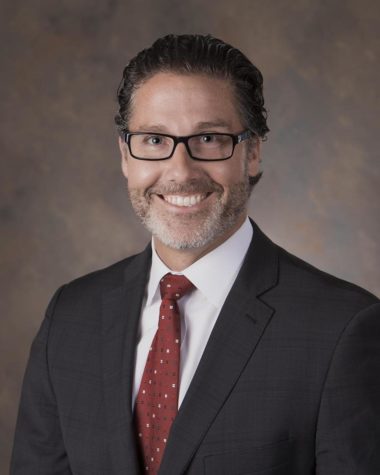
Cardinal Nation: Why is it important that schools and the city work together?
Bill Wade: I think anytime you have the city and school on the same page financially it allows for more efficient operations, so I think that benefits both the city and the school district. We have a good work relationship with our city so we’re very blessed to have that. A great example of that would be what they demonstrated here today with the Fire EMT program with the ability to use that space – the fire station there for our students – is just an amazing opportunity and does not add any additional costs.
Cardinal Nation: How does the success of the school district affect the local economy?
Bill Wade: It’s probably more the opposite – it’s more how the local economy affects the state of the schools. So the economy has a direct impact on us in a variety of ways whether it be from interest that we earn in our investments during that time or whether we have to continue to be more efficient in our operations to reduce spending because as we are right now, heading into a potential recession. We have to be cognizant of that – we have to be cognizant to protect the taxpayers dollars always, so as everyone’s pockets start to tighten up a bit that can have a direct impact on our ability to get additional revenue.
Cardinal Nation: What did you think of the superintendent’s message today? What were your takeaways?
He’s a new superintendent coming in. I think he really hammered home our Strategic Plan and the great things that we’re doing here at Mentor Schools. And he started to share his vision for the future so I think he did a great job of doing that.
Cardinal Nation: How do you plan on reducing the school budget?
We’ll be starting that process here in the next month or so. At this point we have not made any specific [decisions] but part of it was discussed today. As enrollment goes down, right-sizing the district from a staffing standpoint – because as I said 78% of our budget goes back to salary and benefits – looking at making sure we have enough teachers to maximize our educational experience but not too many at the same time so it’s a balance. Looking at other ways to cut costs in the form of controlling our health care as we shared that today as well, we’re going to reduce that by 14%. For us it goes back to our biggest areas which are our salary, benefits, facilities and special education.
Maggie Cook, Board Member
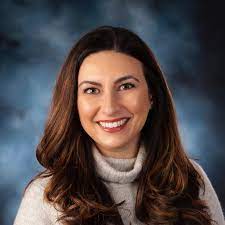
Cardinal Nation: Did the presentation today accurately reflect the views that you portrayed this year?
Maggie Cook: Yes, I’m a first year member – I am on the Board of Education, so I think that it really reflected our Vision Statement that our district has with our Strategic Plan. So, I was glad to hear all about the highlights that reflect our Strategic Plan.
Cardinal Nation: After seeing this presentation, what do you think some improvements could be for next year?
Maggie Cook: Well, I definitely want to increase our safety presence, there are a few things with safety that I would like to see improved in our district. I would also like to see a continuation of growth with career opportunities for students at the high school level.
Kristina Willey, Senior Director for Student Recruitment for Lakeland Community College and Holden University Center
Cardinal Nation: How do you think that both Lakeland and Mentor benefit from their partnership?
Kristina Willey: We are really good K-12 educational partners; we partner on a variety of things – College Credit Plus, which is an opportunity for students to earn college credits while still attending high school as well as the CTE program. I think we try to align educational pathways to make it as seamless as possible for students to move to career opportunities right after high school or even while they are enrolled in high school.
Cardinal Nation: How does continuing this relationship benefit Mentor?
Kristina Willey: I think it benefits our local community, students who are graduating from Mentor High School with high school diplomas can go on to earn associate, bachelors, and master degrees using CCP credits, and continue to live and work right here in our community, which promotes economic development.
Cardinal Nation: Do you believe that there will be a growing number of students who will be participating in CCP?
Kristina Willey: I do. I think that as students are learning about the opportunity to continue to earn college credit whilst in high school they will see that this is an opportunity for students to take different credits for their interested major. They might even finish high school with an associate degree which is just an additional credential that they can use in the workforce, or even with four-year colleges!
Ken Gunsch, Mentor Police Department
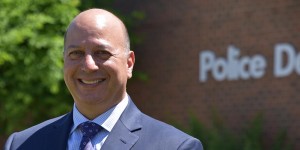
Cardinal Nation: Do you think the drills that take place throughout the schools do an effective job of preparing your responders for a real emergency?
Chief Gunsch: So our upcoming large-scale drill we will have and our active shooter drills really prepare our officers to properly respond. They help us learn to work with the other safety force departments in the school so we can act as one command unit for when an incident happens. It really reinforces that which will help us when a real situation does occur.
Cardinal Nation: What was your initial reaction to the high school’s recent lockdown and how would you say it was handled?
Chief Gunsch: I thought it was handled top-notch, to be honest, I responded, the Fire Chief responded, and we had a lot of officers that came here. We quickly knew that it didn’t seem like a true emergency but we wanted to err on the safe side and we worked really good between the police, fire and the school. It was a good opportunity to practice what we’ve been doing and go back and critique it and see what we could’ve done better, which we did.
Cardinal Nation: And how do your views change as other schools experience crises?
Chief Gunsch: I don’t want to say it changes. We are always at a heightened sense of security when we’re talking about the schools, anywhere in our community, even the businesses. It just always is forefront that something can happen no matter where – you’re not immune to any of that.
Support Public Education in Mentor (parent group)
Member: We are really excited about the things we heard today. What they said at the end is exactly right – no matter what other people say, this is one of the best school districts.
Kyle Martin, CTE Student (EMT Program)
Cardinal Nation: How does your demonstration today impact the successfulness of the EMT program?
Kyle Martin: I think it helps support what we’re doing. I think we get to do a lot of really cool stuff and we’re pushing a career that, like when we talk to the older fire guys, we’re getting into it a lot earlier than they were able to. So, it sets us up for a really early entry into a career. And for the people who are really just trying to get skills under our belt, we get our medical level basics, life support, our CPR and AED training, Stop the Bleed certification…we know how to use tourniquets, pack wounds, and stuff like that. It gets us skills that can really be applied to any kind of emergency situation.
Mr. Heath, Superintendent
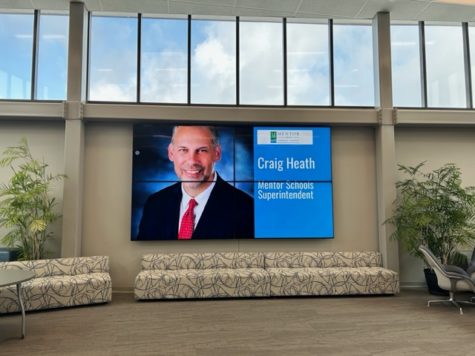
Cardinal Nation: What is your reaction to today’s events now that your presentation is over?
Mr. Heath: I like doing presentations like this, especially when I am really familiar with the subject matter because then I can just speak off the cuff a little bit more and I know exactly what I am talking about. There are still some things that I am learning about the district so that’s where I kinda had to read a little bit more than I would’ve liked to, but just to kind of get this first one out of the way and present the four pillars right now. Now, next year because we’re going to be redoing that Strategic Plan it’ll be a little bit different…This is a great group of people to speak to. I mean, these are the business and industry leaders in our city so anytime we can start to connect some of the things we do with students in our buildings with what they’re doing in the workforce right now, those connecting points are going to be huge for us in the future. Again, we do so many cool things in Mentor. What we do from the CTE standpoint, from the College Credit Plus standpoint, from internships, it’s just amazing what we do.
Additional Resources:
View Mr. Heath’s presentation here.
View Mentor Schools’ Annual Quality Report here.
View Mentor Schools’ Fiscal Year 2022 Report here.
